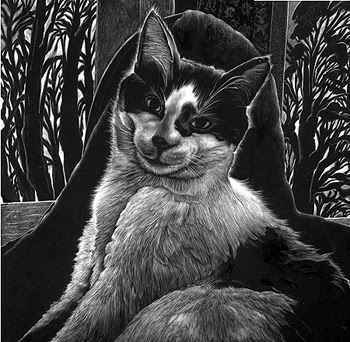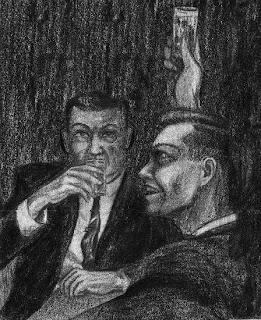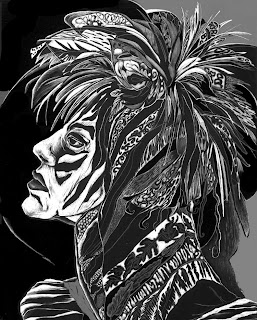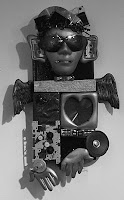"Bob", Will declared sternly,
"You perform well in front of the camera. But
every time I see you back-stage, you're
pacing, biting your nails, and moaning about
something."
"Yeah. Sure. I know." As one of the station's two leading
weathermen, Bob had to seem part wizard, part scientist, part
seasoned outdoor explorer; his TV public expected him to brave
the elements wielding a gilded barometer and squinting through
jewel studded binoculars at omens scrawled in mist across the
underbellies of clouds. After so many years on the job, he could
don his costume, hunch his back, pull his brow into a concerned
omniscient frown, and intone his lines automatically; recently,
however, he'd spent too much time grumbling to Will, his
weatherman partner.
"I know all about our history," Bob rubbed his palm
repetitively up and down the armrest; underneath, the fabric
shimmered, scuffed smooth, shiny and pale. Bunch of
incompetents!, the public had shouted in protest against
weathermen: All that fancy equipment, they'd do as well with
divining rods and crystal balls! Where'd they get their science
training? Sue them! No, shoot the frauds! If they're gonna pull a
fast one on us, they should pay! "I know how
they used to treat us. You're right. We have it good. I should
just say my lines and forget. I should remember that these are
good times, remember to forget."
Bob scratched spasmodically at his uncombed, slightly matted
beard as stiff and gray as a brillo pad. Ever since his
grandmother's death a month earlier,
he'd felt more and more irritable; he
remembered too much. Whenever he glanced at the regulation
polyurethane container in which her ashes were sealed, his
stomach twitched in rebellion; he felt like vomiting up
everything he'd eaten and heard during the
last twenty-five years. When he tried to sleep, his heart beat
out thunderous warnings and the muscles in his legs writhed,
trying to squeeze out invisible toxins; something primordial
pounded at his skull and hammered in the dark emptiness behind
his eyes. He told himself that he was merely grieving for his
grandmother, the only person who'd excited his
imagination in a world scrubbed clean of spontaneity. He reminded
himself that his grandmother and her stories had come from an
archaic time, best forgotten, before scientific regulation had
freed the world from fear and inconvenient surprises.
Before scientists had learned to control the weather, people
expected perfect predictions from their meteorologists. If the
forecast read "blizzard", people stockpiled groceries and Aspirin
for the backaches that followed shoveling; if the forecast read
"sunny", people anticipated feeling happy. When drivers,
surprised by an ice storm, crashed their cars, everyone blamed
the weathermen. After an unforeseen tornado toppled the main
street of a mid-western capitol, multi-million dollar settlements
didn't calm the public outrage; the assassin of a meteorologist
was pardoned on the grounds of justifiable homicide. After a
hurricane veered abruptly off course, crashing historic landmarks
and burying a coastal city under toxic silt, members of the
underground organization Cloudsmart bombed hundreds of weather
stations. The time had come for science to tame nature.
Now, rain fell only between midnight and 6 AM. No more than a
half-inch of snow, guaranteed to melt in hours, ever fell.
Occasionally, the government staged a midday thunderstorm or a
blizzard "just like in the good ole days" to stimulate the
citizens with a show of environmental novelty; the people were
warned a week in advance. Children read about tornadoes and tidal
waves in history books and marveled at the hardships endured by
primitive society.
Bob had gleaned his own knowledge about the weather of ancient
times from history books, reprinted photographs, old videos, and
tales told by his grandmother, who'd lived through subzero chills
and soil parching heat during childhood. As Bob dressed for his
show, where he and Will would tell the nation what sort of
weather the government had planned for its citizens, he thought
of Grandmother's mementoes, a lifetime of
accumulated photos, letters, e-mail print-outs and news clippings
saved in musty boxes now stacked in Bob's
apartment. Since her death, he'd spent hours
daily examining the artifacts of her life, squinting at yellowed
scrawl and faded type on paper dried to parchment brittleness and
studying the figures in tea-stained photographs speckled with
basement mold.
One photo, of his grandmother as a young woman with head thrown
back, drinking rain through her open mouth while shimmering
silver curtains poured from her outstretched arms, stood out; Bob
had tacked it centrally above his bed.
"For a while, I wanted to be a
storm-chaser, wanted to woo nature," Grandmother had
told him. "I was a child of the
elements."
In the hot, moist wind, I'd stand outside among the thrashing
trees, abandoning myself to the power and willfulness of the air.
Bob knew the story by heart, recounted and embellished in so many
of Grandma's electronic letters. When I went
storm-dancing, I wore a long wide skirt that whipped in the gusts
until welts rose on my legs. I drank in the energy of the frantic
electrified air, the rain surging down like an angry mob. I was
the Storm Dervish, whirling wild and fast as a twister down the
water-polished streets as the rain drummed, thunder clanged, and
the wind sang soprano death-scene arias. Damned if I was going to
carry a purse when I went storm dancing; I spent a night in the
town jail when the cops found me, spinning down a deserted street
while lightning lashed the sky, without ID and unable to prove
that I wasn't high or crazy. That was my last storm dance - in
2002. I mourn that part of my life, but it's not something I
could do anymore, even if the weather still was a beast calling
to other beasts; one has to be young, free and fearless to
surrender to the poetry of wildness.
Will slid into his usual seat next to Bob. "Yeah, I'm glad I
didn't work in this field back then," He pulled a towel around
his shoulders, ready for the technician to apply his make-up.
"Nowadays, we don't have to worry about insane crowds. We don't
have to predict anything."
Bob winced. "Back then, we would have been doomed prophets. Now
we're just actors". His grandmother had known theatrical skies
and operatic winds. "But I wonder how it feels to experience
something more unexpected than a stubbed toe."
In this time when even nature had been cured of orneriness, news
anchors reported global peace, family harmony, affluence
throughout the nation, and empty prisons. According to one rumor,
however, the long peace was a fiction, invented after the
anti-war protests of 2032 had raged to near revolution; a few
reportedly had glimpsed secret footage of American infantry
charging into a charred jungle during an ongoing, decade-long
African war. Some speculated that the president was a holographic
image, and that a secret faceless group ruled the country; others
argued that the president avoided public appearances, preferring
videotaped speeches even during the campaign, due to a history of
frequent assassination attempts. TV reporters merely read from
teletype, never leaving the studio; journalists fleshed out
computer data sent from the official news bureau. Most people
clung to the hope that officials and experts wouldn't lie and
that they could trust in the continuing calmness of the world.
"Huh? What's that about stubbed toes?"
"Nothing," Bob grunted, as Tina, the make-up technician with
spiked fluorescent hair tugged his beard into place. Her
Jingle-Band bracelet tinkled a melody from one of the
day's top-ten hits whenever it slid up or down
her arm. At Tina's squawked command, the chair
hummed and angled Bob's face upward; Tina
draped a protective white bib over Bob's
costume, then muted her Jingle-Band bracelet so that they could
all hear the big television that murmured, bleated and squealed
above the make-up counter.
"Aren't you the lucky
one!" Tina's fingers fluttered
over cotton wads and jars of pigment; the stars etched into her
long nails glowed, screaming yellow and shrieking orange against
a shy pink background. "I
can't think of a better show to watch while
you're getting pampered.
It's my daughter's favorite
show, and mine, and my sister's, and even my
husband's; we all try to sneak a look, even if
that means telling the boss we're sick and
have to spend extra long in the ladies' room.
But you must know how it is, being a TV guy yourself. When
something extra-exciting's calling to you, how
can you say
"'no'?"
The dressing room's large set played
continuously, always showing the station's current broadcast.
Most other performers envied the weathermen. The program airing
just before their studio appearance ranked as television's most
popular; many said that Bob and Will, watching the
day's most exciting show from reclining chairs
while nimble fingers massaged pigment into their cheeks, were the
luckiest of men.
Trapped between the chair and Tina's roving
hands, Bob stared at the big screen.
"Welcome to Psycho-Moms From Hell!" On screen, the show's host
swaggered across the stage in his sequined jacket while horns
blasted to a crescendo in the background. "Which psycho-Moms will
make it into the pit? And which one will make it out, as a
challenger for the fifty-million-dollar prize? Remember, only one
of the chosen will survive to become the star. So, girls and
boys, tell the audience why your Moms are nuts enough for the
mega-million dollar Psycho-Mom of the Month award."
Bob gulped back the burning fluid that lurched up from his
stomach and seared his throat.
"My Mom dresses like a tramp," the first teenage girl squealed.
"She wears earrings that dangle all the way to her shoulder,
eight on each ear; you can hear her coming from a block away,
like she's wearing cow bells. She uses fluorescent orange eye
shadow. And when she walks through the mall, she lets one
tattooed breast hang out of her blouse, so all the passing guys
stare at the snakes feeding from her nipple. From the way she
dresses, you'd think she was my age"
Will snorted. "Hooters from Hell! All the tit
men wanting to grab a feel and not paying any attention to the
daugther - wanna bet the kid's just
jealous?"
"My Mom won't let Robo-Maid in her room to clean," the second
teenager batted large green eyes at the camera. "She says she
doesn't want anyone invading her privacy, even a machine. So her
clothes are all over the floor, stacked five feet high. She can't
even find the remote control in all that mess".
In the dressing room, Tina's hand hovered over
Bob's face, a moist tan sponge gripped between
thumb and forefinger. "I sure hope my
husband's watching this, him always calling me
a slob" she tittered. "What they
should do — what would be really exciting
— they should sell tickets to see these Nut
Cases up close and personal. Meet the belle of the bells, and
listen to her tinkle as we chase her. Or visit this
privacy-freak's nut house in Fruitcake City,
and watch her try to keep Robo-Maid from doing its job. You
couldn't stop my Robo-Maid from cleaning
unless you took a hammer to her instrument panel;
they're made to be persistent,
isn't that a fact?" Bob nodded and
shut his eyes, trying to recall his
grandmother's words and photos from that other
time.
"No, keep those eyes open, I need them big
and wide to get the shading and wrinkles just right,"
Tina clucked. Bob cleared his throat, gulped, and stared
obediently ahead. In front of him, on the glaring screen, the
show's host strutted to another fidgety
teenager.
"Purty crazy!" the announcer crooned. "And let's hear about Mom
number three"
"My Mom keeps hundreds of pet roaches." The girl spat a wad of
purple gum into a tissue and tossed back her blond hair. "She has
them all in little cages. They all have their own names; she's
even painted designs on some of their backs. The one called
'Sunflower', has a big acrylic sunflower painted on it; there's
'Lilac' and 'Violet' and 'Dandy Lion'; she swears they all have
different personalities. She's trying to train them to roll over,
and the meaner ones to do guard duty, attack a robber when she
shouts 'Sic him, Rover Roachy, sic him!' It wouldn't be so bad if
she didn't like to eat with her favorites; she coos to Sunflower
and Violet over a bowl of spaghetti, then claps when they perch
near her coffee cup and wave their antennae at her. I even wrote
a poem about it, you wanna hear?"
"Do we want to hear it?" the host asked the audience.
"Yes!," the audience cheered.
"Are we sure we want to hear it?"
"Yes, yes, yes!" the audience screamed.
"O.K., it' s called 'Roachy'," the girl cleared her throat as she
unfolded a piece of paper, "And goes:
Attach a leash to your roach,
Strut proudly in the lead.
When critics gawk and reproach,
Say "He's an exotic breed,
Sired specially and pedigreed",
Say "My roach is not an 'it' - a 'he',
And he's very cheap to feed.
So I pamper him with luxury -
A hotel where he and wife can breed."
"Purty crazy!" the host boomed. "So, audience, which will it be,
Mom number one, Mom number two or Mom number three? Will it be
the scamp of a tramp, the robo-phobe or wretched roachy?"
"Three! three! three!", the audience shouted.
"Who?", the host bellowed.
"Roachy! Roachy!" The audience chanted, clapped, and stomped its
feet.
In the adjacent chair, Will coughed. "For my
mother, a roach was Public Enemy Number One.
She'd have shot them if she owned a gun, but
she had to crush them; then she handed us kids paper towels and
ordered us to wipe up the pieces of shell and the oozing bug
juice. Didn't want to touch even the tip of a
roach leg - but that's normal."
Will snickered. "Those roaches must have
crawled into this lady's brain. Watching her
in the pit — you can't beat
that for excitement, can you?"
Bob grunted. "Manufactured
excitement," he sneered inwardly. When his
grandmother was young, the world had seemed like a capricious and
willful creature that frightened and exhilarated humans with the
whims of its weather and its politicians; people sometimes
trembled, but they knew that something unpredictable would jolt
them awake after a period of too much calm. Adrenaline junkies,
people needed a frequent adrenaline fix. Possibly, the need was
coded in our genes; in a world of constant, predictable calm,
people hungered for the unexpected;
yesterday's surprise no longer shocked them
awake and they needed the increasingly loud and putrid to arouse
their sleeping senses. "Today, when the wind
must call on schedule", he seethed,
"We create artificial excitement".
As Tina rubbed fragrant, calming oils into
Bob's neck, he squeezed his eyes shut against
the roiling images on screen. The applause of the studio audience
softened into the thrumming of ancient, wayward winds: The wind
pranced up a roof and somersaulted down. The field was its
trampoline and tree branches its jungle gym. It shook confetti
leaves loose; they spun up, then tumbled to ground, scribbling
the field with streaks of paintbox red and crayola yellow.
Grandma, pictured as a little girl in another snap shot, pranced
out in her little-girl shoes, to play tag with the cartwheeling
wind; she dashed to the crabapple tree, her very own juggle-ball
tree, with its thousand dangling round purple fruits that the
wind might have hurled into the forever-blue sky if only it
hadn't impulsively decided to play elsewhere.
Bob recalled that photo of a five year old Grandma, her dress
billowing and hair swirling, more vividly than he recalled any
moments from his own life.
"Come on, be a dear and open those gorgeous
eyes for me so I can do your face right," Tina cawed.
As she pried open his lids with her raucously painted talons,
Bob's gut writhed and his foot shook
spasmodically.
"Roachy, Roachy!" The shouts
stabbed Bob like surges of high voltage current.
"O.K., bring her out!" A squat, orange haired woman in a purple
caftan waddled forth. Her name and story had been submitted to
the networks months before; she'd already passed three screening
auditions testing that her personality, as well as her psychosis,
would excite viewers. She raised her plump fists victoriously
over her head, shook them in time to the chanting, then sat
grinning in the seat beside her daughter.
"O.K., Mizzz Ruthy Roachy, you're Psycho-Mom of the day; you've
won a chance in the pit." The host's voice deepened to a growl.
"But can you scratch, claw and beat your way out of the pit, to
that five-million dollar prize in the sky? Let's look at your
competition."
A gaunt face with lava hair and midnight-dark eyes scowled on
screen. The audience hissed.
"That's last week's champion Psycho-Mama, Ms. Mean of Green, mass
murderer of trees. She's got a vendetta against oaks, hacked down
a yard of 200 year old trees with a rusty axe, even though her
robo-gardener would take care of any pruning and raking; now her
yard's full of knee-high stumps. And when the government staged
that snowfall last winter, she tried to shovel it off her
driveway with a kitchen spatula, even though everyone knew the
white stuff would be melted in a day. She may look small but
she's tough; so far, she's beaten four Psycho-Moms into dust.
Ten-in-a-row and she's a megabucks, mucho moolah, millionaire
Mama, even if she quits and doesn't go for higher stakes. So,
Mizzz Ruthy Roachy, can you beat the Lean Meany of the Green to
the prize?"
"Roachy! Roachy!", the audience hollered.
"Roachy! Roachy!", Tina and the other make-up technician cheered.
Bob clenched the armrests with his fists until the straining
knuckles burned with the white of hot steel.
"What kind of a world is this?" he
spat into his beard, then clamped his lips shut.
On screen, spikes of neon-red hair stuck out from a crimson face;
the wide eyes, hot as embers, burned furiously. The audience
booed.
"That's Dame Dread of Red, who'll also meet you in the pit. Her
favorite colors are fire-engine red and black. When she moved
into her house, she bought a hundred gallons of paint; now the
walls and stairs are hot red, while the ceiling, carpet and
electrical outlets are black. She yanked out all the original
plumbing, installed a red tub and black toilet. She drives a red
car with black seats and only wears black dresses with red shoes.
She sits under a sun lamp all day, to keep a fiery burned
complexion; 'Better dead than not red', she tells dermatologists
when they warn her about skin cancer. Can you beat Red and Ready
in the psycho-pit?"
"Roachy! Roachy!", the audience screeched. "You can do it, go
Roachy!"
"You can do it!" Will cheered. "Go Roachy!"
"Roachy! Roachy!", the make-up technicians chanted.
Bob wiped the sweat from his neck with jerky staccato rubs as an
inner fire seared his skin. "What kind of a
world is this?" he growled. "What
kind of a world is so desperate for thrills?"
On television, the stocky woman rose from her chair, raised her
fists and flung back her head.
"I can do it! I'll scratch them till they bleed, punch them till
they drop, kick them when they're down and out till no more juice
is in them. I can do it; I'm Psycho-queen!"
The losers would die in the pit, beaten to death by the other
contestants; usually, the victorious Psycho-Mom emerged with
broken bones, bruised organs and scars, but famous, five million
dollars richer and a contender for the fifty-million dollar
prize.
The audience roared.
"Roachy! Roachy!" In homes and offices across the nation,
housewives and break-time employees cheered and booed. Tina
hissed, then hurled a moist sponge at the screen; the other
make-up specialist stomped her foot and chanted. Will bolted
upright, shaking his fists. Every face purpled; bulging neck
arteries throbbed, pulsing hot with anger or triumph as the
championed Psycho-Mom, who seemed more real than the
viewer's own biological mother, punched,
kicked and clawed for blood in the celebrity arena.
Bob, the only one still seated, gaped at the screen and gasped
for breath. Two women would die in the pit; one would emerge,
battered, rich, today's celebrity cheered for
the moments of excitement she'd given to a
dulled audience. Was this what happened when everyday life became
artificially predictable, routine and comfortable, sapped of any
suspense?
"You're on in three minutes, " an intercom voice bleated over the
buzzing commercials. Both weathermen reached for their floor
length capes of gold and silver, studded with rhinestone stars
and moons, and fastened these over cobalt blue shirts and
trousers. Each lifted a pearly wand from the stand.
Bob rubbed his wand carefully, then leaned against the door. "I
wish I could do something different tonight," he mumbled, staring
at the floor. "Like forecast a blizzard for tomorrow."
"A what?" Will glared at his companion. "You know that they've
planned sunshine for the next month. So why would you defy the
script? People would panic if they thought the weather wasn't
going according to plan. And what about tomorrow, when it's sunny
all day? You'd probably lose your job. Everything would be in
chaos. People wouldn't know whether or not to
trust the weather bureau."
Bob frowned, then sighed loudly. "Don't you ever get bored just
reading scripts the officials hand you? Don't you ever want a
little excitement, something unpredictable?"
"Maybe," Will protested. "But this is a good job. All we have to
do is wear these capes, read lines someone else writes, and look
serious, the way people imagine sorcerers would look. If I want
excitement, I can turn to Psycho Mom. But not in real life; I
don't want surprises in my real life."
"Showtime in sixty seconds,"
the intercom rasped.
The weathermen ambled down the corridor, each stroking his beard
to a point to resemble that worn by a fairy tale magician.
Suddenly, Bob stopped, beating his wand against the floor like a
cane. "I do! I want surprises. And maybe I'm
not the only one." He straightened his back until he seemed as
tall and indestructible as a lightning rod; the glittering tip of
his wizard's cap seemed ready to scratch the
sky. "People know that the weather's
government controlled. But, maybe, some of them still want to see
us as forecasters in a universe full of mystery. They want to
believe in the possibility of excitement. They want to
anticipate, want to wake up to more than programmed days of
comfortable monotony. Maybe they want to know that some can hear
divine music in a way unexplained by genetics and evolution; they
need prophets and the unpredictable."
"You were born centuries too
late," Will chuckled.
"Computers are always right; they're programmed to be." Bob
insisted. "If they're not,
there's something wrong with the software. You
know what distinguishes the prophet, or any human, from the
machine?" Bob stared past his partner, at something
encoded in the crystalline air. "He's
sometimes wrong."
Will shook his head. "A medieval monastery,
that's where you belong."
"Beauty and magic require randomness. And prophets have immense
power." Bob's dark eyes burned, embers
untouchably hot with passion, under his frosted false eyebrows.
"For evil, maybe," Will spat out.
"Could be, " Bob clutched his wand to his chest; his fist gleamed
like a tiny moon against the swirling nebulae stitched in his
cloak of flaming violet. "But I want to see what it's like to be
a prophet of gloom. Tomorrow there will be a
blizzard…."

 by Sean J. Vaughan
by Sean J. Vaughan































